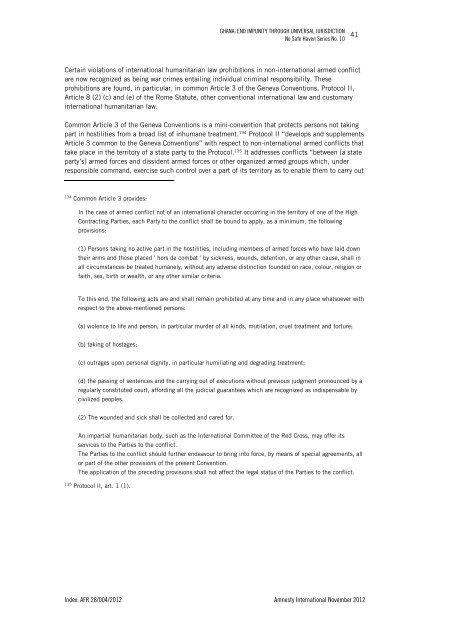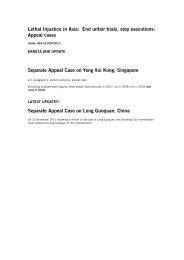40GHANA: END IMPUNITY THROUGH UNIVERSAL JURISDICTIONNo Safe Haven Series No. 10By incorporating by reference breaches of the Geneva Conventions and their Additional Protocolsinto the Geneva Conventions Act, <strong>Ghana</strong> defines collective punishments, despoliation of thewounded, sick, shipwrecked or dead, and indiscriminate attacks injuring or killing civilians ordamaging civilian objects as war crimes in a manner consistent with customary international law. 130As set forth in Section 1 (4) of the Act, <strong>Ghana</strong> courts can also exercise universal jurisdiction overthese crimes.In addition, the Criminal Code defines slave dealing in a manner that is general enough to includethe crime of slavery itself, 131 but <strong>Ghana</strong>ian law does not specifically indicate that slavery anddeportation to slave labour committed during armed conflict could constitute war crimes, in line withcustomary international law. 132 Chart IV also demonstrates that <strong>Ghana</strong> has authorized its courts toexercise universal jurisdiction over slave trade and traffic in slaves. 133 <strong>Ghana</strong> has not authorized itscourts to exercise universal jurisdiction over the remaining crimes in Chart IV.4.3.1.4. War crimes in non-international armed conflict: Common Article 3 of the GenevaConventions, 1977 Protocol II, Rome Statute, other conventional international law and customaryinternational law130Geneva Conventions Act, 2009 (Act 780), sect. 1(3); Customary <strong>International</strong> Humanitarian Law, Rule 103(Collective punishments are prohibited); Rule 111 (Wounded, sick and shipwrecked must be protected frompillage and ill-treatment); Rule 113(Despoiling or pillaging the dead is prohibited); Rule 11 (Indiscriminateattacks are prohibited); Rule 156 (Serious violations of international humanitarian law constitute war crimes).131Section 314 of the Criminal Code states:(1) Whoever—(a) deals or trades in, buys, sells, barters, transfers, or takes any slave; or(b) deals or trades in, buys, sells, barters, transfers, or takes any person in order that that personmay be held or treated as a slave; or(c) places or receives any person in servitude as a pledge or security for debt, whether then dueand owing or to be incurred or contingent, whether under the name of a pawn or by whatever othername that person may be called; or(d) conveys any person, or induces any person to come, to <strong>Ghana</strong> in order that such person maybe dealt or traded in, bought, sold, bartered, or become a slave, or be placed in servitude as apledge or security for debt; or(e) conveys or sends any person, or induces any person to go out of <strong>Ghana</strong> in order that thatperson may be dealt or traded in, bought, sold, bartered, transferred, or become a slave, or beplaced in servitude as a pledge or security for debt; or(f) enters into any contract or agreement with or without consideration for doing any of the acts oraccomplishing any of the aforementioned purposes; or(g) by any species of coercion or restraint otherwise than in accordance with the Labour Decree,compels or attempts to compel the service of any person,shall be guilty of second degree felony.132See Customary <strong>International</strong> Humanitarian Law, Rules 94, 95, 156.133Courts Act, sect. 56 (4) (a).<strong>Amnesty</strong> <strong>International</strong> November 2012 Index: AFR 28/004/2012
GHANA: END IMPUNITY THROUGH UNIVERSAL JURISDICTIONNo Safe Haven Series No. 1041Certain violations of international humanitarian law prohibitions in non-international armed conflictare now recognized as being war crimes entailing individual criminal responsibility. Theseprohibitions are found, in particular, in common Article 3 of the Geneva Conventions, Protocol II,Article 8 (2) (c) and (e) of the Rome Statute, other conventional international law and customaryinternational humanitarian law.Common Article 3 of the Geneva Conventions is a mini-convention that protects persons not takingpart in hostilities from a broad list of inhumane treatment. 134 Protocol II “develops and supplementsArticle 3 common to the Geneva Conventions” with respect to non-international armed conflicts thattake place in the territory of a state party to the Protocol. 135 It addresses conflicts “between [a stateparty’s] armed forces and dissident armed forces or other organized armed groups which, underresponsible command, exercise such control over a part of its territory as to enable them to carry out134Common Article 3 provides:In the case of armed conflict not of an international character occurring in the territory of one of the HighContracting Parties, each Party to the conflict shall be bound to apply, as a minimum, the followingprovisions:(1) Persons taking no active part in the hostilities, including members of armed forces who have laid downtheir arms and those placed ' hors de combat ' by sickness, wounds, detention, or any other cause, shall inall circumstances be treated humanely, without any adverse distinction founded on race, colour, religion orfaith, sex, birth or wealth, or any other similar criteria.To this end, the following acts are and shall remain prohibited at any time and in any place whatsoever withrespect to the above-mentioned persons:(a) violence to life and person, in particular murder of all kinds, mutilation, cruel treatment and torture;(b) taking of hostages;(c) outrages upon personal dignity, in particular humiliating and degrading treatment;(d) the passing of sentences and the carrying out of executions without previous judgment pronounced by aregularly constituted court, affording all the judicial guarantees which are recognized as indispensable bycivilized peoples.(2) The wounded and sick shall be collected and cared for.An impartial humanitarian body, such as the <strong>International</strong> Committee of the Red Cross, may offer itsservices to the Parties to the conflict.The Parties to the conflict should further endeavour to bring into force, by means of special agreements, allor part of the other provisions of the present Convention.The application of the preceding provisions shall not affect the legal status of the Parties to the conflict.135Protocol II, art. 1 (1).Index: AFR 28/004/2012 <strong>Amnesty</strong> <strong>International</strong> November 2012
















